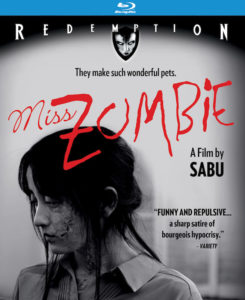A Japanese Zombie Film With Undying Sympathy
DIRECTED BY SABU/JAPANESE/2013
STREET DATE: JANUARY 2, 2018/REDEMPTION FILMS
 Zombies are real.
Zombies are real.
That’s the premise behind the visually striking 2013 high-end Japanese horror film Miss ZOMBIE, currently finding its way to North American homes on an eye-opening Blu-Ray, courtesy of Redemption Films.
Shot in high contrast black and white and unusually silent, Miss ZOMBIE presents a world much like our own, except, there are zombies. No apocalypse, no end of society as we know it; just the question of how humankind can best exploit the creatures. Zombies have levels, we are told. A low level zombie, it’s reasoned by some, might be acceptable as live-in help. Only problem is, they don’t exactly move through their household to-do lists with much logic or efficiency.
The Japanese actor and filmmaker known as SABU (here, merely credited as “Sabu”) has delivered what may be the most sympathetic zombie movie ever made. Artful and dynamic, Miss ZOMBIE is a quick but compellingly stationary piece of work; the tale of a young lady zombie brought into a sparse, modern home as a domestic servant. (Heartbreakingly portrayed by Ayaka Komatsu).
Miss ZOMBIE has it’s own rules, it’s own internal logic, and, at only eighty-five minutes in length, no room for anybody else’s.
Even in the world of the film, this is considered a highly controversial if not flat-out radical notion. The Powers That Be which lord over the family’s impersonal luxury dwelling catch wind of the new arrival, and are not happy. “This is dangerous!”, they intone, for the sake of their community and anyone watching who’s never seen a zombie movie. This man, however, is thoroughly right and wrong.

As we witness the zombie scrubbing the same spot again and again and again like a stuck record, it becomes quickly apparent that zombies do not make the best in-home help. As the wealthy homeowner who bent local rules to acquire her witnesses this with a look of satisfaction (played by Tôru Tezuka), it becomes quickly apparent what bringing her in in the first place might really be all about: slavery for slavery’s sake.
Although it’s tempting to allege a simple bottom line that Miss Zombie demonstrates how the wealthy rich are so dead inside that even the undead poor feel more deeply than they do, it’s not quite so cut and dried. George Romero himself, the father of modern zombie horror, gave us a version of that in his 1985 Day of the Dead. Sabu, also the writer of Miss ZOMBIE, dares to explore a maternal connection, an empathy and lack thereof, respectively between the young undead would-be mother who’s lost everything, and a well-off young wife who’s wanted for nothing. (Makoto Togashi, playing shell shock like nobody’s business).

When one of life’s tragedies strikes, we witness the unlikeliest of martyrdom, selfless actions put forth by someone with less than nothing left to lose. This amid a house-wide snowballing of sin once Miss Zombie is delivered; her presence intended as not just a servant, but an early try-out in an ambitious business plan for marketing the undead as pets. Each one comes with a manual, strictly intoning she not be fed meat; and a loaded pistol, should she need dispatching. As the man said, this is dangerous. The consequences play out not just with piercing social relevance, but no shortage of obtusely dark humor.
Miss ZOMBIE has it’s own rules, it’s own internal logic, and, at only eighty-five minutes in length, no room for anybody else’s. Redemption Film’s Blu-Ray edition is a visual marvel of extreme blacks, whites, and greyscale, courtesy of Director of Photography Daisuke Sôma. There are no substantial extras, which is a shame, but by no means a dealbreaker for those interested in adding this taut, touching and shocking zombie horror film to their shelves. For a highly stylized horror allegory, Miss ZOMBIE is about as “real” as one might hope for. With redemptive bite, this film is no miss.


